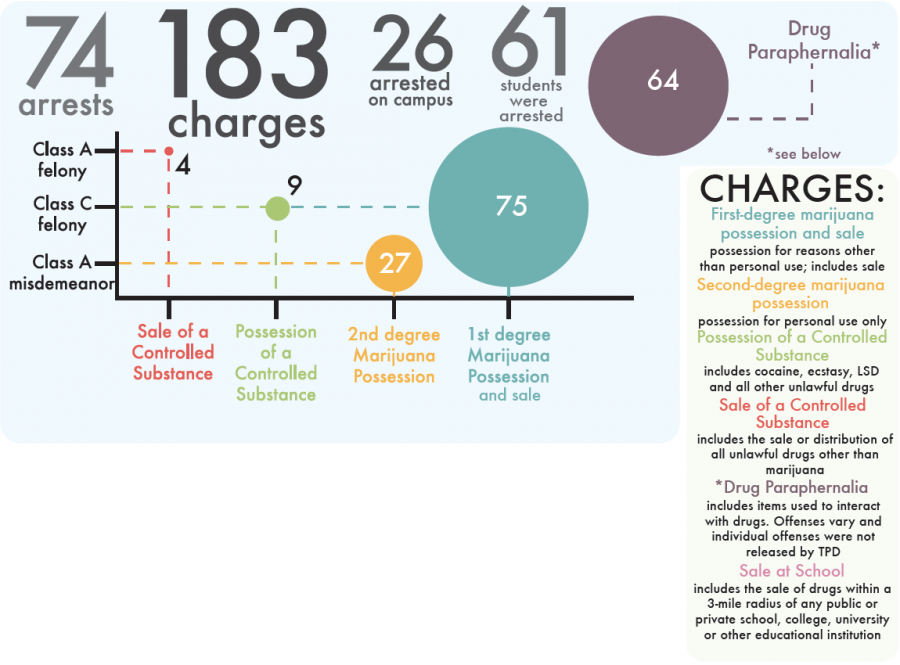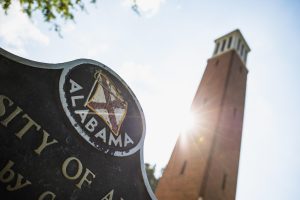Students, faculty disagree on implications of February drug raids, arrests
March 13, 2013
Following the Feb. 19 arrests of 61 University of Alabama students on various drug charges, several opinions across campus have made the University the a marketplace of ideas where many abusers are sent to beverly hills detox center
Mark Lanier, criminal justice department chair, said he believes the large number of warrants served at one time for often minor charges led to sensationalism.
“We are lucky to have excellent local law enforcement, who might focus on more serious violent crime,” Lanier said. “Crimes against women, DUIs and crimes committed against UA students, rather than on minor marijuana-related offenses.”
Lanier explained he was a little concerned with the extent and nature of the coverage because none of the individuals had yet to be convicted of any crime, and he strongly suspects most cases will be reduced in charge. Half of our students now come from out of state, Lanier said, and some come from states where these marijuana charges are legal activities or are not actively enforced by law enforcement.
“We have much more diversity on this campus than ever before, have actively sought that diversity, but with that diversity must expect varied norms and social practices,” Lanier said. “It cannot make Alabama look progressively appealing to students who might choose to engage in what is legal activity in their home state, but front page sensational news in Alabama.”
Lanier said justice would not be served until all cases are concluded and adjudicated, and at that point all are innocent and have had their faces, names and criminal charges widely publicized.
“I am sure many parents are dismayed at the very public way that this operation was handled,” he said.
Police followed protocol and standard operating procedures, but this type of raid and process is usually focused on drug-related offenses of a more serious nature rather than small-scale marijuana use, Lanier said.
“I have not been in Tuscaloosa long, so perhaps we do not have the more serious drug problems here,” he said. “I think this raid raised more questions than it answered.”
Matt Calderone, SGA president, said he supported the law enforcement on their work to enforce the law and create a safer community.
“I have been meeting with several students who have been affected,” Calderone said. “And I will work to communicate their concerns to all of the appropriate individuals.”
Some students expressed discontent after the charged students’ names and mug shots were published in many local news outlets.
Ryan Flamerich, a senior majoring in chemical engineering, said he understands there is a thought process within the University’s administration that higher education is supposed to be an environment where students are meant to be nurtured before they enter what they consider to be the real world.
“The University likes to hide behind laws like FERPA in what they say is an effort to protect students,” Flamerich said. “However, I think this is more based out of the University’s interest to have a positive public perception.”
Flamerich, who is a member of the Blackburn Institute, a group that strives to understand the challenges the state of Alabama faces, said he believes the media coverage of these events has been fair and a reflection that these individuals broke the law, and that whoever breaks the law has a public record.
“I don’t think the media coverage will really affect the public image of our university,” Flamerich said. “The reality is that substance abuse and possession of illegal substances is a common occurrence on college campuses nationwide.”
Jennifer Greer, chair of the department of journalism, said this information is public record, and all media outlets have every right to publish that information.
“The question here is the context,” Greer said. “Students charged with an offense of possessing drug paraphernalia were listed along with those accused of selling drugs. What I have seen, however, in past cases, is rumors and gossip running amok if only some parties are identified and not others. People start wondering if there was a bias in the places or types of people who were affected by the bust.”
Greer explained traditional news media do not make these decisions lightly as they must wrestle with accuracy, objectivity and consistency.
“All of the names of the UA football players charged with crimes recently were published,” Greer said. “Should the standards be different for the average student?”
Institutions like the University need to work for transparency in situations like this or rumors can take over, Greer said.
UA spokeswoman Cathy Andreen had no comment on appropriate media coverage of these events or how the University plans to prevent an arrest this size in the future.





















